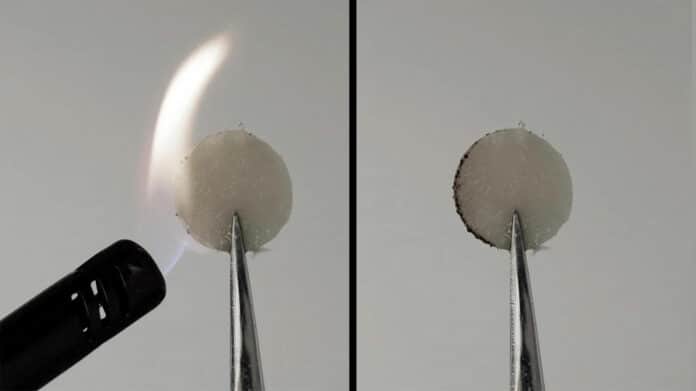Lithium-ion batteries are ubiquitous in modern-day energy supply systems. However, the volatile and flammable nature of the electrolytes remains a safety challenge.
Now, researchers at Stanford University have developed a non-flammable electrolyte for lithium-ion batteries that is able to endure high temperatures without catching fire. The electrolyte was developed by Rachel Z Huang, a graduate student, and her colleagues at Stanford and SLAC National Accelerator Laboratory.
Conventional lithium-ion battery electrolytes are made of lithium salt dissolved in a liquid organic solvent, which improves battery performance by helping to move lithium ions around. However, it’s also a potential Firestarter. Defects and rising temperatures can cause these electrolytes to swell up and ignite. This process normally kicks off at around 140 degrees F (60 degrees C), where solvents in the electrolyte start to evaporate, transforming from liquid to gas and inflating a battery like a balloon – until the gas catches fire and the whole thing goes up in flames.
“One of the biggest challenges in the battery industry is this safety issue, so there’s a lot of effort going into trying to make a battery electrolyte that is safe,” said Rachel Z Huang, the first author of the new study.
Huang and her team wanted to produce a polymer-based electrolyte that could offer both safety and performance. So they decided to add as much as they could of a lithium salt called LiFSI to a polymer-based electrolyte and test the limit. Usually, less than 50% of a polymer-based electrolyte’s weight is salt. The team bumped that number to 63%, creating one of the saltiest polymer-based electrolytes ever. This was paired with flammable solvent molecules, with the two forming a symbiotic relationship that benefits the battery’s safety and performance.

The overall electrolyte, known as Solvent-Anchored non-Flammable Electrolyte (SAFE), proved non-flammable at high temperatures during tests in a lithium-ion battery. The solvent molecules help conduct ions, resulting in performance comparable to that of batteries containing conventional electrolytes.
But, instead of failing at high temperatures like most lithium-ion batteries, batteries containing SAFE continue to operate at temperatures between 77-212 degrees F (25-100 degrees C). Meanwhile, the ample added salts act as anchors for the solvent molecules, preventing their evaporation and, in turn, fire.
“This new finding points out a new way of thinking for polymer-based electrolyte design,” said Zhenan Bao, a professor at Stanford University and investigator with the Stanford Institute for Materials and Energy Sciences (SIMES), who advises Huang. “This electrolyte is important for developing future batteries that are both high energy density and safe.”
In addition, the team’s new electrolyte has a gooey form similar to conventional electrolytes, which means it can fit into existing, commercially available lithium-ion battery parts, unlike other non-flammable electrolytes.
“This very exciting new battery electrolyte is compatible with the existing lithium ion-battery cell technology and would make big impacts on consumer electronics and electrical transportation,” said Yi Cui, a professor at SLAC and Stanford.
Journal reference:
- Zhuojun Huang, Jian-Cheng Lai, Xian Kong, Ivan Rajkovic, Xin Xiao, Hasan Celik, Hongping Yan, Huaxin Gong, Paul E. Rudnicki, Yangju Lin, Yusheng Ye, Yanbin Li, Yuelang Chen, Xin Gao, Yuanwen Jiang, Snehashis Choudhury, Jian Qin, Jeffrey B.-H. Tok, Yi Cui, and Zhenan Bao. A solvent-anchored non-flammable electrolyte. Matter, 2022; DOI: 10.1016/j.matt.2022.11.003
